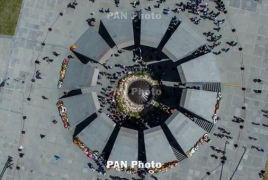Four narratives of Turkey's denial of Armenian Genocide September 9, 2017 - 11:58 AMT PanARMENIAN.Net - Turkish journalist and political analyst Uzay Bulut has revealed an article about the four main narratives that Turkey uses to deny the Armenian Genocide. The feature on The Armenian Weekly reads: Narrative One: We Did Not Slaughter Armenians; Armenians Slaughtered Us Accusing Armenians of being mass murderers and the actual perpetrators of genocide is a popular myth in Turkey. This narrative is what is now taught to Turkish schoolchildren in middle and high schools. Professor Taner Akçam wrote a comprehensive article for the Armenian Weekly about how the 1915 genocide is depicted in Turkish history textbooks used during the 2014 and 2015 school years. Those books are either prepared by the Ministry of National Education or approved by the Ministry’s Instruction and Education Board. Narrative Two: Yes, We Did Slaughter Armenians. If They Do Not Behave, We Will Slaughter Them Again This narrative is similar to the first one but takes it to a new and even more shameless level: to something to be proud of, and additional threats against the Armenian victims and other minorities. This sentiment is also openly and frequently expressed across Turkey. This narrative proudly accepts that Turks slaughtered Armenians, but they have an excuse: “Yes, we did exterminate Armenians. But ask us why. Because they misbehaved and became traitors. And, if required, we will do it all over again. One cannot get even an inch of territory from Turkey,” an Aşkale mayor said. “We will do it all over again,” in fact, seems to indirectly target Kurds, declaring to Kurds that if they don’t behave well and accept Turkish superiority, Turks will exterminate them, too. Narrative Three: A Tragedy Happened During World War I. Armenians Slaughtered Us, and We Slaughtered Them. It Was Civil War. Let’s Forget About It… This is the narrative Turkey uses for international observers. On April 24, 2015, for example, a message was sent by Turkish President Recep Tayyip Erdoğan to the religious ceremony held in the Armenian Patriarchate of Istanbul on the 100th anniversary of the Genocide. In essence, what this message declares is this: “What happened in 1915 was never genocide. People kill each other in all wars. But we are such noble people we still remember all of the dead with love, so let’s forget about it and move on already.” This third narrative, which is more “moderate” compared with the first and second ones, is just for show, intended for the outside world and particularly for the West: “Look, Turkey is changing for the better and taking steps to face its history. And this proves that we are a worthwhile NATO member an EU candidate.” Narrative 4: Yes, Turkey Committed Genocide This rhetoric is never directly stated by the Turkish government, but it is, at times, tolerated when presented by some intellectuals in the country. Since 2010, rights activists in Turkey led by the Human Rights Association (IHD) have commemorated the 1915 genocide in cities such as Istanbul, Ankara, and Diyarbakir. The government has not prevented the commemoration events, nor has it arrested the organizers. For the government seems to use these events as a public relations stunt for the world. International media do cover these events, so it is easy marketing for Turkish “democracy.”  The Armenian Genocide The Armenian Genocide (1915-23) was the deliberate and systematic destruction of the Armenian population of the Ottoman Empire during and just after World War I. It was characterized by massacres and deportations, involving forced marches under conditions designed to lead to the death of the deportees, with the total number of deaths reaching 1.5 million. Six total incidents have burned 19 old-growth trees. Friday night 8 trees were torched along the beautiful main entrance. The EU does not intend to conduct military exercises with Armenia, Lead Spokesperson for EU Foreign Affairs and Security Policy Peter Stano says. Hikmet Hajiyev has said that there is no place for USAID operation in Azerbaijan any longer. A telephone conversation between Putin and Pashinyan before the CSTO summit is not planned, Peskov says. Partner news |